In the grand tapestry of engineering disciplines, instrumental and control engineering emerges as a refined and intricate thread, intricately interwoven with the fabric of modern technology and industrial advancement. The scope of this multifaceted field extends far beyond mere instrumentation; it encapsulates a profound interaction of theoretical principles and practical applications, resonating across various sectors and leading to innovations that constantly reshape our world.
To elucidate the scope of instrumental and control engineering, one can liken it to the duality of a maestro conducting an orchestra. Here, the instruments in the ensemble represent various physical systems—chemical processes, robotics, power plants, and aerospace technologies, among others. The control engineer, akin to the maestro, orchestrates the operational parameters, ensuring that each instrument plays harmoniously within the desired framework, thereby generating a symphony of efficiency, safety, and reliability.
At its core, instrumental and control engineering is concerned with the design, analysis, and implementation of systems that measure and control physical variables such as temperature, pressure, flow, and level. The scope encompasses an array of technologies, from traditional mechanical sensors to cutting-edge digital systems that employ sophisticated algorithms. Consequently, it serves a pivotal role in industries such as manufacturing, petrochemicals, and aerospace, among others.
1. Measurement and Sensing Technologies
The foundation of control engineering lies in the accurate measurement of physical phenomena. Sensors are the eyes and ears of any automated system. From thermocouples to laser range finders, the evolving landscape of measurement technology feeds the continuous integration and improvement of systems. The development of smart sensors, which employ advanced algorithms to process data on-site, exemplifies the trend towards enhanced accuracy and real-time responsiveness. This nascent sector has expanded applications in fields such as environmental monitoring, biomedical diagnostics, and even smart city infrastructure, making measurement and sensing technologies critical to contemporary engineering.
2. Control Systems Design
The heart of instrumental and control engineering lies in the design of control systems itself. Control strategies can be classified into various paradigms—proportional-integral-derivative (PID) control, adaptive control, and model predictive control are just a few pillars within this domain. Traditional methods are evolving alongside complex computational models that mimic human decision-making capabilities. Through the design of feedback loops, these systems ensure that deviations from the desired set points are corrected, promoting system stability. The ever-increasing demand for precision in sectors such as aerospace reveals the profound implications of control system design, where even a fractional error can lead to catastrophic consequences.
3. Process Automation and Control
No discussion on the scope of instrumental and control engineering can overlook the burgeoning domain of process automation. The advent of Industry 4.0, characterized by the Internet of Things (IoT) and machine learning, has revolutionized how industries manage production processes. Control engineers now strive to create systems that can adapt autonomously to changing conditions. This dynamic ability invites the exploration of predictive maintenance algorithms that foresee potential failures, turning reactive responses into proactive measures. In a world driven by efficiency, the integration of automated process control systems propels industries toward heightened productivity and reduced operational costs.
4. Multidisciplinary Applications
Instrumental and control engineering transcends conventional boundaries, delving into myriad applications across diverse sectors. In the realm of robotics, for example, control systems govern the motion and behavior of autonomous machines. In the medical field, precision control of surgical robots enhances the capability of surgeons, allowing for minimally invasive procedures that significantly reduce recovery time. The convergence of traditional control engineering principles with emerging fields such as artificial intelligence catalyzes innovations that redefine our interactions with technology, heralding a new era of intelligent systems.
5. Environmental and Sustainability Concerns
The modern control engineer must also be cognizant of the broader implications of their work on society and the environment. As global concerns regarding sustainability become increasingly paramount, the role of instrumental and control engineering evolves. It dovetails with the development of green technologies, such as renewable energy systems, where control strategies are crucial in optimizing energy production and distribution. The integration of control systems in smart grids represents a vital step toward managing energy efficiently, balancing consumption patterns while minimizing environmental impacts.
6. Future Trends in Instrumental and Control Engineering
The horizon of instrumental and control engineering is bright, marked by burgeoning trends that promise to further expand its scope. The integration of artificial intelligence and machine learning into control systems is one of the most radical shifts observed in recent years. Such synergy enhances system capabilities, allowing for more intricate control of chaotic systems and greater adaptability to environmental changes. As augmented and virtual reality technologies permeate the industry landscape, engineers are also exploring interactive control interfaces that could transform operator training and system diagnostics.
In conclusion, the scope of instrumental and control engineering embodies a complex and dynamic interplay of measurement, control, and automation technologies. Its influence pervades numerous aspects of daily life and industry, acting as a cornerstone in the pursuit of innovation and efficiency. As this discipline advances, it will continue to weave a narrative of progress, fostering technological developments that enrich societal well-being while addressing critical global challenges.










